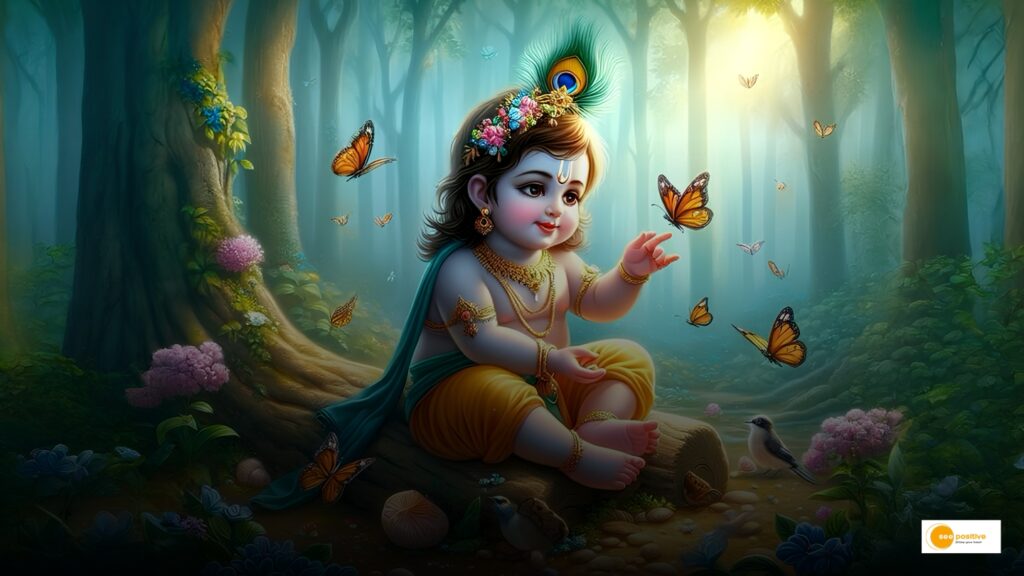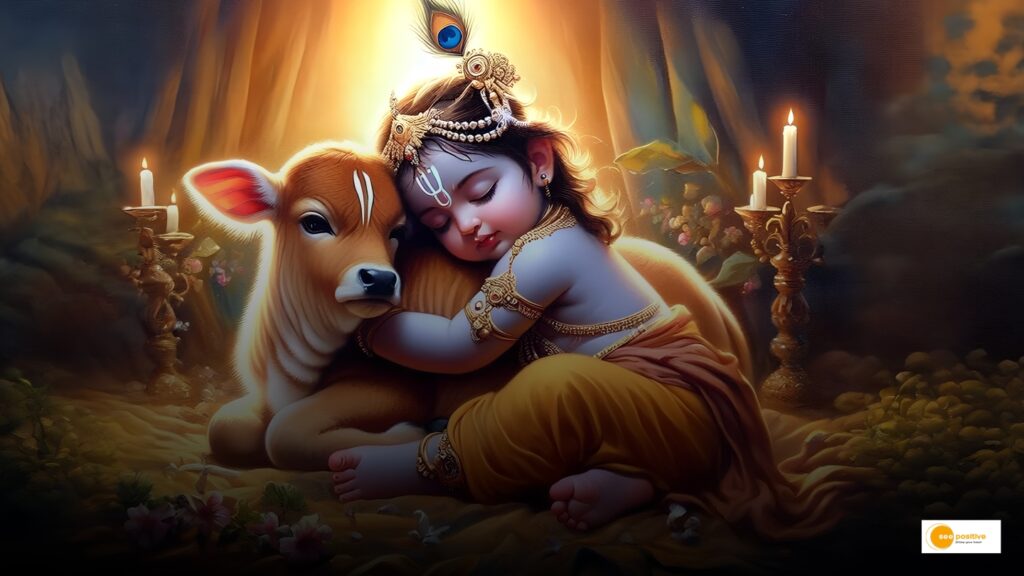Shri Krishna: In Sanatan Dharma, nothing happens by accident. Every event in the cosmic timeline is infused with deeper meaning—no avatar descends by chance, no moment is without purpose. One such profound mystery lies in a seemingly simple question: Why was Shri Krishna born as the eighth child of Devaki and Vasudev? Why not the first, to prevent suffering? Or the last, to conclude the chaos?
The answer lies not in emotional reasoning, but in the subtle wisdom of Dharma, Karma, and cosmic timing. The birth order of Krishna isn’t incidental—it is intentional, mystical, and revealing.
The Significance of the Number Eight in Hindu Philosophy
In Vedic and Yogic cosmology, numbers aren’t just numerical values—they carry energy, vibration, and spiritual symbolism. The number eight (Ashta) holds deep sacred resonance:
- Ashta Lakshmi: The eight forms of divine prosperity.
- Ashta Siddhi: The eight supernatural abilities granted through spiritual attainment.
- Ashtanga Yoga: The eightfold path leading to liberation as laid out by Sage Patanjali.
- Ashta Dikpalas: Guardians of the eight directions of the universe.
Symbolically, eight represents a crossing point—a threshold between the material and the spiritual. While the number seven aligns with the seven chakras, the eighth transcends the cycle, entering the realm of the infinite. In that sense, Krishna as the eighth child is not just a sequence—he is the bridge between the mortal and the divine, the reset button for a world teetering on the edge of adharma.
Why Not the First Child? Dharma Allows Karma to Unfold

Why didn’t Krishna arrive as Devaki’s firstborn and prevent the tragedy of her earlier children’s deaths?
Because Dharma allows Karma to exhaust itself. The six elder siblings of Krishna were not simply innocent lives lost—they were reincarnated souls, bound by a previous karmic curse. According to the Puranic texts, they were sons of Kalanemi, cursed by the asura Hiranyakashipu to be slain by their own father in a future birth.
Krishna’s decision to appear after their karmic debt was settled was an act of divine compassion, not delay. Had he come earlier, Kansa’s evil would have remained hidden and unresolved. Dharma demands that darkness expose itself fully before it can be dismantled. Krishna allowed karma to clear the ground, so that his arrival could mark the beginning of a new age—clean and just.
Why Not the Last Child? Evil Cannot Have the Final Say
On the other hand, why didn’t Krishna come as the last child—after Kansa had exhausted his tyranny?
Because Dharma does not wait for destruction to finish its work—it interrupts it at the turning point.
Krishna was born at the precise moment when hope was dim but not extinguished, when evil reigned but hadn’t yet conquered all. As he declares in the Bhagavad Gita:
“Sambhavami Yuge Yuge” – I manifest in every age when Dharma declines.
He arrives not too early to prevent struggle, and not too late to render salvation pointless. He enters when the world is still redeemable, reminding us that divine timing is never random—it is perfectly aligned with the cosmic clock.
Born in Chains: The Symbolism of the Prison

Why did the Lord of the Universe choose to be born in a dark prison, to a powerless couple chained by fear?
Because truth does not require comfort to manifest, and divinity thrives even in the darkest corners of suffering.
- Devaki and Vasudev were not ordinary parents—they were chosen instruments, purified through suffering to receive the Supreme.
- The prison cell symbolizes the human condition—bounded by ego, fear, and fate.
- When Krishna was born, the locks opened, the guards slept, and the river Yamuna parted. Nature bowed, not to violence or magic, but to the arrival of Dharma.
This was a divine message: when the time of truth arrives, even the walls of bondage fall without force.
The Eighth Child: A Cosmic Code, Not a Coincidence
Krishna’s birth as the eighth child is not trivia—it’s sacred code. Each detail of his arrival was orchestrated to deliver profound spiritual insights:
- Let darkness reveal itself fully—but do not lose faith.
- Even in the worst of times, the divine is preparing its descent.
- The number eight signifies transcendence—a point where karma dissolves and grace begins.
- Krishna is not just Murlidhar (the flute player), but also Karma-Kshaya—the one who ends karmic cycles.
He didn’t come first to prevent karma.
He didn’t come last to avoid struggle.
He came exactly when Dharma must rise again—as it always does, right on time.
A Lesson in Timing, Trust, and Transcendence
The story of Krishna’s birth on Janmasthami isn’t just about mythology—it’s a lesson in divine timing, spiritual law, and inner trust. In our own lives, when things seem unjust or delayed, Krishna’s arrival reminds us:
The divine never arrives too early, nor too late—it arrives when we’re ready to rise.
So the next time you hear of Krishna, the eighth child—know this:
He is the end of the old, and the beginning of what’s eternally right.


